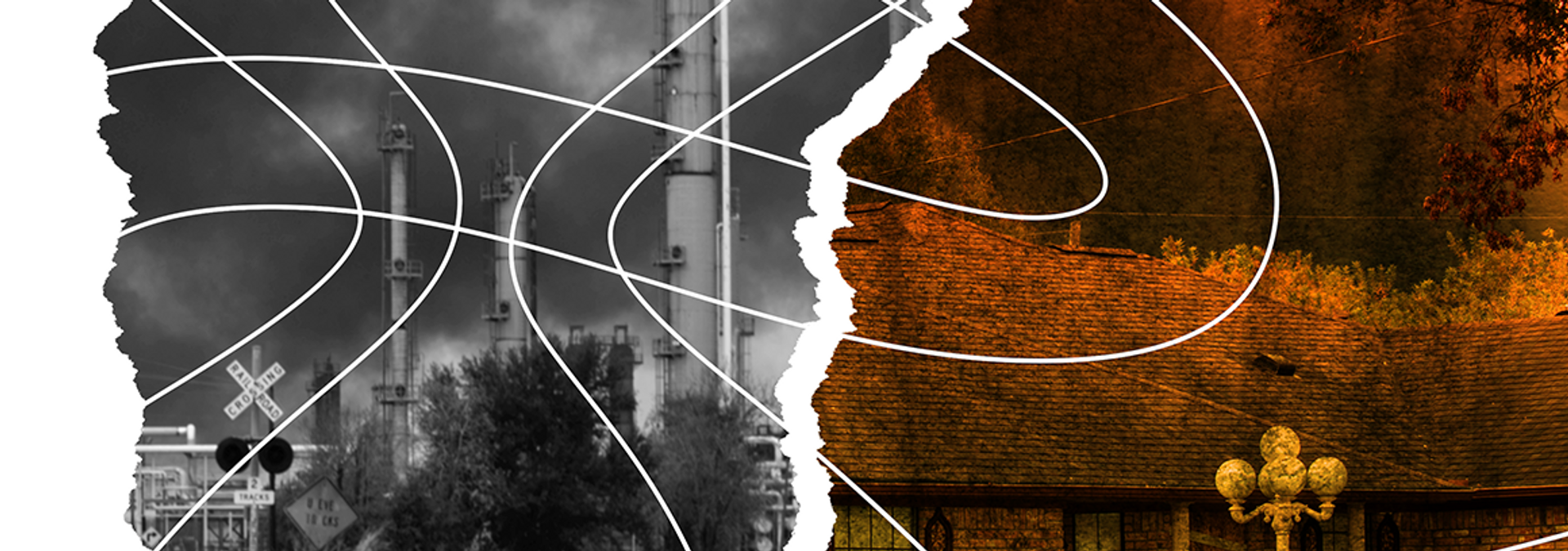
Does Texas know what's in the air in Port Arthur?
Texas' system of monitoring and reliance on polluter self-reporting leaves communities exposed and the picture of air quality hazy and incomplete. Illustration: Evan O'Neil.
John Beard has seen so many industrial disasters that he can recite the Texas Commission on Environmental Quality’s regional hotline number by heart: 409-898-3838.
A lifelong Port Arthur resident, former city councilman and refinery worker turned environmental advocate, Beard remembers one of these disasters in particular: In April 2017, a fire at a wood pellet plant called German Pellets ignited and kept burning for months, sending harmful pollutants like nitrogen oxides, carbon monoxide and volatile organic compounds along with soot into the surrounding West Side neighborhood — a low-income and predominantly Black community that’s also across the fence from some of the largest industrial facilities in the county, like Valero and Motiva.
The German Pellets fire lasted well into July, one of the longest emergencies the Port Arthur Fire Department had ever dealt with. When TCEQ arrived on the scene, Beard noted where the agency placed their temporary air monitors, meant to document concentrations of pollution. The data is crucial to understand what residents, some living just a few miles from the fire, were breathing for months; the agency could also use the data to hold German Pellets accountable for breaking the law.
“I saw where they put the four monitors, and only one of them would have been effective in terms of monitoring what was coming from that fire,” Beard says. “The shifting winds and terrain made it difficult to place [the monitors]. One of the questions that I raised with the region's TCEQ was, ‘Why do you have it so far to the north and west, when the wind is blowing the plume right between the two of them? And you have nothing in the community itself to show what people are directly in.’”
Jefferson County has some of the largest oil refineries in the nation and a cluster of plastics and chemical plants like TPC Group’s. The 85-year-old Oxbow coke plant, fewer than three miles from Beard’s childhood home, is one of the largest polluters in Texas. In all, there are 54 facilities handling toxic chemicals. Nearly 5 million pounds of chemicals were released into the air in 2020. But Jefferson County lacks a local pollution control department, and TCEQ maintains only 12 permanent air monitors. Most of these measure the six pollutants the Clean Air Act requires. But, when a fire rages or a plant leaks and explodes, the closest monitor could be miles away — and there might not be any monitors nearby tracking the concentration of cancer-causing toxics like 1,3-butadiene. Worse, that chemical continued leaking for more than a month after the TPC Group explosions that forced 50,000 Jefferson County residents to evacuate a day before Thanksgiving in 2019.
TCEQ says they spend just over $11 million a year on their state-wide stationary air monitoring network, which comprises 255 monitors — about one monitor, on average, for every 1,000 square miles in the state. The agency has three mobile monitoring vans and six staff members based in Austin ready to be deployed during emergencies like hurricanes or chemical disasters. They also said they will deploy smaller SUVs with monitoring equipment to disaster-prone Houston, Beaumont and Corpus Christi. In the last legislative session, state lawmakers granted the agency an additional $250,000 to hire four more full-time employees to work in coastal regions like Port Arthur. But this came after the agency had to cut its 2020 budget by $34 million during the pandemic and recession, after cutting its overall budget 35 percent since 2008, as the industries that pose the threats grew.
The agency appears to see no problems with this. In their report ahead of the required once-every-12-years sunset review, which begins in Spring 2022, TCEQ wrote there were no barriers or challenges that impede the air monitoring program’s effectiveness. During emergencies, the agency says they have no role beyond “regulatory oversight and technical guidance.”
RELATED: How the sunset review gives Texans a chance to shape TCEQ into an agency that works for everyone
But emergencies like hurricanes and winter freezes often double as major pollution events. In advance of a storm, facilities enact emergency shutdown protocols to prevent damage or what they call “upsets.” The unprocessed chemicals and gasses in pipelines have to be cleared to prevent a blowout. If the shutdown process is left to the last minute, massive quantities of those compounds are burned off as fast as possible. In the early days of Hurricane Harvey, industry self-reported that 340 tons of extra industrial pollution was released in Harris and Jefferson counties in communities like Beard’s. This is precisely when TCEQ is taking down their already sparse network of monitors to prevent damage.
And industry’s self-reporting, which TCEQ relies on, is narrow. “[TCEQ’s] database does not include all the illegal air pollution that the companies choose not to report for any reason. And you can imagine why companies don’t want to report all their illegal air pollution,” says Tom Pelton with the Environmental Integrity Project. “Nor does it include illegal air pollution released during the routine, daily operation of business — only emissions during a special category carved out for accidents, explosions, maintenance, startup and shutdown activity.” Taken together, this system is leaving communities exposed, with serious gaps that raise questions about what’s really in the air.
Recently, the University of Texas’ environmental law clinic donated a few monitors to Beard’s organization, Port Arthur Community Action Network, to help residents monitor soot and volatile organic compounds nearby. “The idea is that community members, when they smell something, or see something like a fire or an explosion — they can take the monitors to where they think there might be a problem,” says Kelly Haragan, an attorney who runs the clinic. The monitors aren’t powerful enough to provide enough data for residents to bring legal action against companies, but they can be a starting point to ask for direct action from TCEQ or pressure local politicians to address the issue. “It gets you further than you would be just saying you could smell something in the air,” she says.
And importantly, community monitoring can confirm what people already suspect: That the air they’re breathing could be harming their health. “We need a blanket around these neighborhoods so that we can have real-time monitoring and actually know what’s going on,” Beard says.
Decades of segregation in Southeast Texas persist, and Black residents of Jefferson County are more likely to live closer to the pollution. Residents living closest to the polluting industrial plants in the Golden Triangle have experienced higher than average rates of cancer, studies as far back as the 1980s have shown. They also suffer elevated rates of cancer compared to the state-wide average. Beard himself has diminished lung capacity that he blames on the pollution that has hung over Port Arthur since his childhood days.
During his time on Port Arthur’s city council, he says that he realized that corporate citizens weren’t going to work very hard to fix the problem on their own. It wasn’t until 2018, after a community-led lawsuit, that the EPA mandated that plants monitor benzene — a potent cancer-causing chemical produced during oil and gas refining — at their property lines with communities. “You have to have the heavy hand which holds the hammer — from the government and from TCEQ and others to reinforce that they need to do better,” Beard says. “Telling me that this is all permitted is not acceptable. That’s insulting.”
He’s tired of hearing about the turkeys Exxon Mobil or Valero pass out at Thanksgiving and the gift cards donated at the holidays. “Those are things they do to look good and make themselves feel good,” Beard says, “but it does nothing to clear the air.” What he wants, he says, is the information that communities need — and a state agency that will use it to protect their health and safety.
Ahmed is a freelance environmental reporter based in Dallas, Texas. Her work focusing on environmental justice has been published in the Texas Observer, Texas Monthly, Southerly and other outlets. You can find her on Twitter @amalahmed214.
STAY UP TO DATE
The quality of our newsletter is considered satisfactory and poses little or no risk.
SUBSCRIBE

